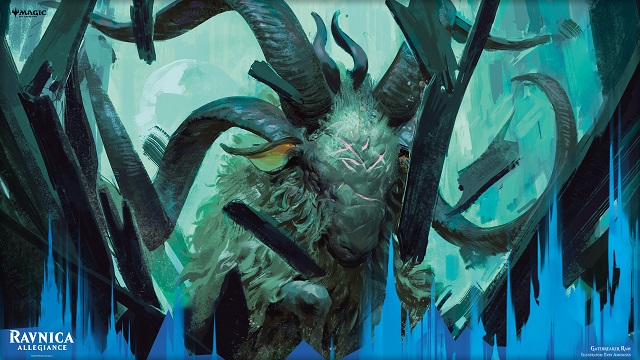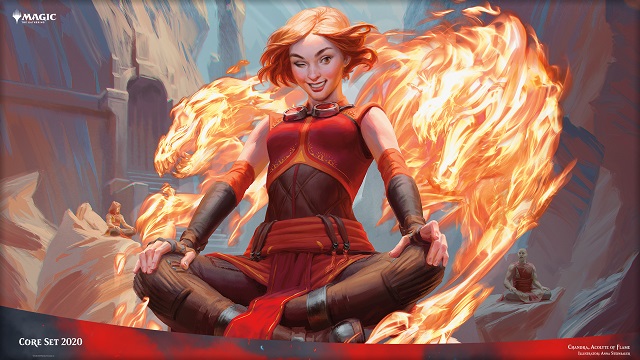Field of the Dead has finally disappeared from Magic Arena. It was a land that summoned swarms of 2/2 Zombie tokens and was easy to splash into any deck and extremely frustrating to play against. While it’s on the banned list, it’s not the only annoying strategy running wild in Arena. While the Thief of Crowns now rules the competitive scene, at least there’s a back and forth when playing against the smirking planeswalker. There are plenty of janky strategies in Arena that only see one side having fun. Here are the telltale signs that you’re playing against an annoying also-ran deck, and what you need to do to ruin someone’s fun.
Magic Arena | Breaking the Gates wide open

The Deck: Based around a specific breed of lands from Ravnica, Gate decks focus on dropping as much mana as quickly as possible before summoning huge creatures before you can set up your board. Because of the relatively low price of most of the deck’s key cards, this is a common deck for newer players to run with, especially since it can burn through many other strategies when they’re running at less than 100%.
The Culprits:
- Growth Spiral and Guild Summit: accelerators that effortlessly get more Gates on the field and give more options for combos.
- Gates Ablaze: In this deck, Ablaze is a three mana Wrath of God, an easy board wipe for whenever things look unfavorable.
- Gatebreaker Ram and Gate Colossus: Massive titans that cost little to no manna to produce in this environment, can come out as early as turn three.
- Archway Angel: The late-game bomb that can bring players back from the brink of death.
ALSO: Magic: The Gathering Arena needs these Historic cards in its binder
The Strategy:
The giveaway for this deck lies in seeing two guild gates of wildly different colors hitting the field on subsequent turns. There are few reasons to run five-color decks in Standard outside of getting Rams and Colossi out as quickly as possible. If you see this, it’s time to go full aggro. Gate decks have very few options early in the game, especially since the majority of their mana enters play tapped. Playing numerous creatures and attacking often stands as your best bet. Your aim is to overtake your opponent before they play one of their beefy boys.
If you’re playing a slower deck, it’s all about picking and choosing your targets. Whether you have counterspells or creature destruction at your disposal, you’ll want to save your tools for one of their two big creatures. You’ll also be dealing with Archway Angel if you get past more than a few turns. Countering that spell could save your games if you get deep in the thick of it with a Gates player.
Magic Arena Decks | Elemental tribal, my dear Squee

The Deck: First truly supported in Core Set 2020, Elemental tribal plays out pretty much identically every time you face it. An easy one-two combo of boss creatures boosts an admittedly varied field of attackers with an overwhelming quickness.
The Culprits:
- Risen Reef: An accelerator that brings new lands into play whenever a creature hits the field. Also one half of the deck’s key combo along with…
- Omnath, Locus of the Roil: A card that provides creature destruction, creature boosts, and card draw. When combined with multiple Risen Reefs, the potential is there for long turns that build unstoppable elemental armies.
- Creeping Trailblazer: Provides a boost to every other creature in the deck and serves as a devastating finisher if the board is full of Elementals
- Chandra, Acolyte of Flame and Chandra, Awakened Inferno: Both immediate troublemakers once the board is set. Acolyte of Flame brings in two Elemental tokens each turn, both of which trigger Risen Reef. Awakened Inferno provides an easy to reach board clear that only affects your opponent with her second ability.
The Strategy:
Risen Reef is a top priority for destruction whenever it hits the field. The Reef will rarely attack or interact with other cards, but its passive ability is key to the deck’s overall strategy. Without the Reef, a player is much more reliant on a straight-up battle, which will make for a much more fair fight in the long run. Once you destroy one, expect to see another couple of Reefs pop up. You know they’ll be running four. Omnath is a similar threat, but it’s much less easy to abuse without a Reef to back it up.
For slower decks, Elementals are a bit easier to deal with. Their main victory condition still revolves around combat, so damage reduction, bouncing spells, and big walls will do the trick nicely. As long as your strategy doesn’t just involve full frontal assault, you can usually bypass the battlefield and hold off the elementals until it locks into place. Just be sure not to discount Creeping Trailblazer, as a player might just wait to build up a huge board when stalled out before overrunning you with two to three big swings.
Magic Arena Decks | Ajani and friends

The Deck: A white/black deck filled with cheap lifegain to fuel Ajani’s Pridemate and Bloodthirsty Aerialist. Black gives wide creature destruction while white offers combat tricks and spot removal for your biggest threats.
The Culprits:
- Ajani’s Pridemate and Bloodthirsty Aerialist: The deck’s main damage dealers. They’ll gain more power with every spell the deck throws out.
- Healer’s Hawk: A white weenie worth worrying about. Flying puts it out of reach of some decks, and the quick life gain will quickly build up a buffer if players don’t have their tools ready at the start.
- Dawn of Hope: A card draw engine and late-game mana sink for more Lifelink creatures, this enchantment is often in the background but often wins games unnoticed.
- Ajani, Strength of the Pride: This planeswalker will give massive lifegain later on, produce more Pridemates via tokens and clear the board of threats if you’re not careful. Quite the toolbox.
The Strategy:
The key to winning against this particular deck is taking out Pridemate/Aerialist before they start ramping up. They don’t have huge bodies, so luring them into blocking or zapping them is vital. Dealing with more than one can be killer in a deck focused around gaining life. With that in mind, even sacrificing some ground on the field is a top priority if you can get rid of them is a top priority.
Outside of that, speed is key. Unless you have an equally stupendous ramp as your victory condition, you’ll want to prioritize building things up and dealing damage to counteract the lifegain. These decks will often hit you from every angle, including tap lands that give life and various other support spells. Certain decks can deal with this naturally, like Rakdos running Tibalt, Rakish Instigator. Others will just need to focus on surviving and taking out key targets to prevent their opponent from gaining a foothold.







